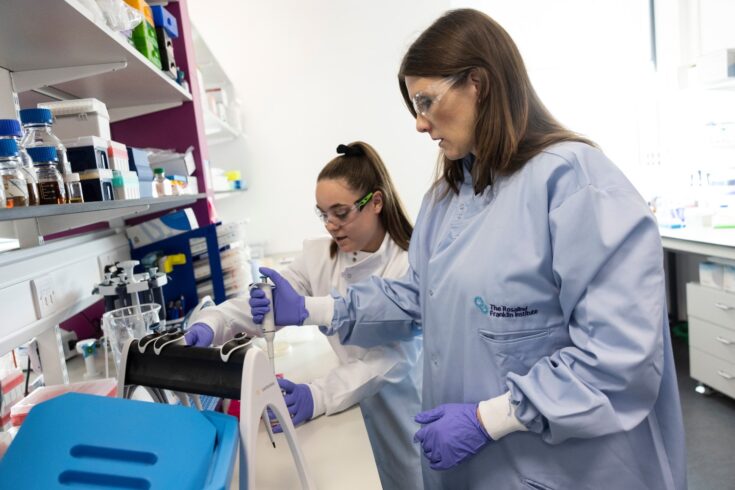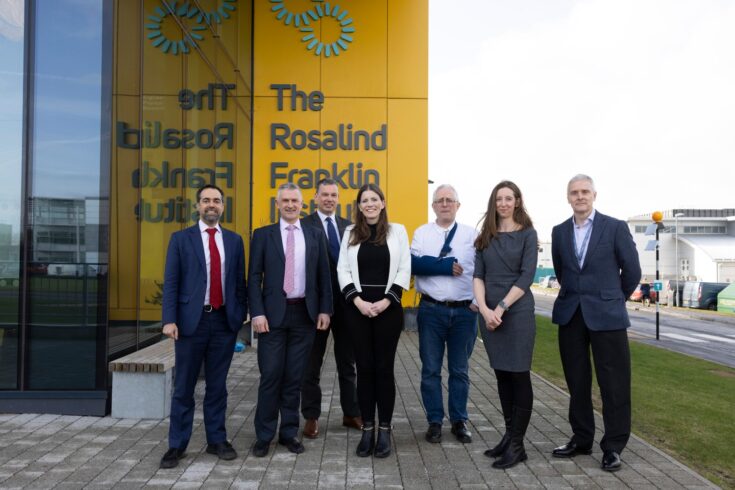The Secretary of State visited the institute today following the announcement of the creation of the Department for Science, Innovation and Technology (DSIT).
Addressing major health research challenges
The Franklin is the UK’s institute for technology in life science. The £40 million investment announced will ensure it remains at the forefront of efforts to develop new technologies to address major health research challenges.
The funding is delivered by UK Research and Innovation’s (UKRI) Engineering and Physical Sciences Research Council (EPSRC).

Credit: Rosalind Franklin Institute
Science, Innovation and Technology Secretary Michelle Donelan said:
Science and technology has the potential to change our world beyond recognition and improve all our lives.
A brand new and dedicated department for Science, Innovation and Technology is key to the Government’s plan to grow the economy – generating better, well paid jobs and driving improvements in health, education and transportation.
The new department has received a warm welcome from the science, tech and business communities and it’s now my job to use the department to build on our world leading strengths in AI, life sciences, quantum, fintech, and green technology to deliver tangible and positive change across the UK.
Building on early successes
The Franklin, which is based on the Harwell Science and Innovation Campus, opened in September 2021 following an initial £103 million investment in 2018, delivered by EPSRC.
The funding announced today will help the Franklin to build on early successes in generating clinically relevant agents against SARS-CoV-2 during the pandemic and advancing electron imaging development.
Key strategic collaborations
They have also established key strategic collaborations with international instrument manufacturers:
- Thermo Fisher Scientific
- JEOL
- Bruker
- Waters
The technologies under development at the Franklin will be utilised to address major challenges in health, such as characterising the early signs of degenerative diseases such as Alzheimer’s disease.
In the future, using real patient tissue samples will enable disease dynamics, drug effects and diagnostics to be carried out with atomic level insight.
Transforming our understanding of life
UKRI Chief Executive Professor Dame Ottoline Leyser said:
The establishment of the new Department for Science, Innovation and Technology is an incredibly exciting development, signalling the government’s commitment to building a fully joined up research and innovation system.
This initiative will capitalise on our world-class talent and skills to deliver excellent public services, a vibrant innovation-led economy and high-quality jobs for citizens across the UK. UKRI looks forward to working with all our stakeholders across government and the sector to make this ambition a reality, transforming tomorrow together.
The work of the Rosalind Franklin Institute is a great illustration of how we will deliver on this ambition. The advanced technologies being developed at the institute are transforming our understanding of life, and as a result helping us to address a wide range of health challenges.
The investment in the underpinning engineering and physical sciences research that we are announcing today will help us to diagnose conditions such as Alzheimer’s earlier and arm us against the threat posed by emerging diseases.
Creating and combining advanced technologies
Professor James Naismith, Director of the Franklin, said:
Since 2018, we’ve built the building to time and on budget, staffed it, installed beyond state-of-the-art instrumentation, which we are helping to develop, and published some of the world’s most cited papers.
In phase 2 we really want to push forward our vision to see life at the atomic scale from molecules, to cells, and into tissues, and accelerate the development of novel diagnostic and therapeutic products by creating and combining advanced technologies.

